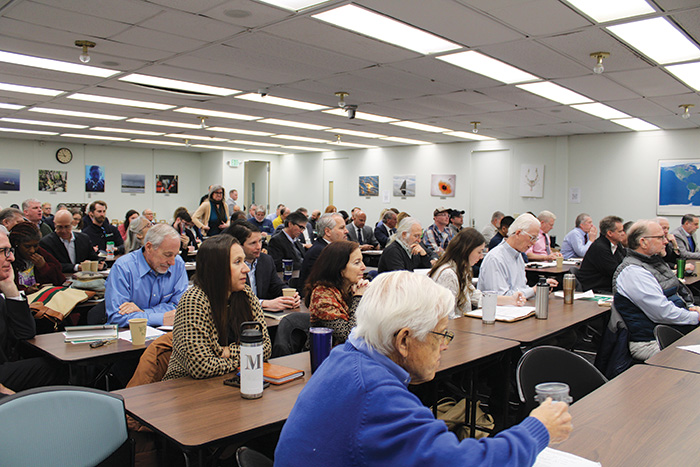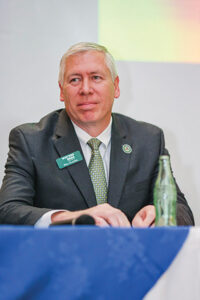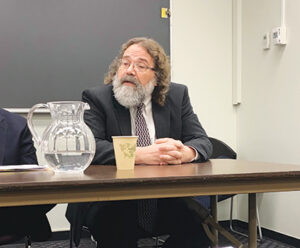Exploring the advocacy and benefits of community outreach when advancing infrastructure projects in North America.
By Will Flower
Advocacy can be defined as taking action to support and build consensus to advance a cause, project, or proposal. Proactively advocating for cost effective and environmentally sound projects to manage solid waste is a best practice. Developers should work with all stakeholders to foster awareness and understanding of projects while soliciting insight and community concerns and recommendations.
“We live during a time when society tends to be adverse to change—even when the change results in a better service or improved programs,” said Jimmy Winters, Owner of Winters Bros. Waste Systems of Long Island. “NIMBYism is still common, and the majority of people don’t fully understand the intricacies, complexities, and economics of recycling and waste management systems. I’m reminded of Henry Ford’s response when he was asked about customer input in the development of the Model T, to which he replied ‘If I had asked people what they wanted, they would have said faster horses.’
“While Ford’s comments may work for new products, I believe that when developing large scale infrastructure projects—such as solid waste facilities—it is best to invest in education and outreach while spending considerable time listening to stakeholders as plans for the future are developed.”

Who are “Stakeholders”?
Stakeholders can be individuals, groups, entities, and organizations who are impacted by the outcome of a project or a process. Stakeholders may be within or outside the project developer’s organization. Some examples of stakeholders include employees, investors, community members, neighbors, civic organizations, customers, suppliers, elected officials, lawmakers, regulators, and competitors. The common thread among all stakeholders is that they have an interest in the success of the project.
Why Advocacy Matters
Outreach and advocacy are important to get perspective on your project. Outreach is also an opportunity to inform stakeholders of projects and discuss benefits and community concerns. By talking to and listening to a variety of audiences, the waste and recycling industry demonstrates its commitment to be responsible stewardship of the environment. We also get to spread the word that we play an important role in the community as a problem solver.

others and gathering perspective from stakeholders is one of the most beneficial communication tools for developers.
Open discussions and incorporating
community concerns into development projects often results in better projects.
How to Advocate
In your advocacy efforts, you need to work to educate, motivate, conjugate, and empower stakeholders. The steps listed can help to convince the public and government officials that the waste industry is a responsible steward of the environment and an important part of the community.
Listen
Listening is a most important skill for good advocacy. By listening, we can learn. Good two-way communication provides an opportunity to listen to feedback that can be helpful in developing a better project. There should be open channels for stakeholders to ask questions and get information. There should also be opportunities for the public to provide comments on the public record. It is important to view communication as an ogoing process to listen, give, and get information.
Educate Stakeholders
Educate stakeholders on the importance of responsible waste management and the environmental benefits of recycling, composting, and other sustainable practices. This can be done through community outreach programs, educational materials, and public awareness
campaigns. All communications should be transparent and factual.
Develop Education/Communication Tools
Develop and distribute fact sheets, brochures, websites, videos, and other communication tools to deliver your message. A project developer should talk about the benefits associated with the project especially the overall benefits for various stakeholders. Discussing the project shortcomings and ways to address community issues will help build trust and demonstrate the developer’s commitment to environmental and community stewardship.
Explain New Technology
Developers often rely on new technology and innovation to solve problems. The waste and recycling industry is amazingly innovative when it comes to reducing the overall environmental impact of managing society’s wastes. From cleaner engines to the use of alternative fueled vehicles, we have made significant advancements in reducing greenhouse gasses and lowering air pollution. Similar advancements are common at recycling centers, transfer stations, and disposal outlets. Explaining the technological advancements in a clear and meaningful way is sometimes difficult. However, well-written and produced communication tools will get the messages to stakeholders.
Advocate for Policy and Legislative Change
The management of society’s waste is complex, and solutions often require a multifaceted approach. Developers should remember that advocate for policy change or legislation to advance sustainable waste management practices should be part of the outreach program. Waste and recycling companies that collect, process, and dispose of the society’s wastes should get additional support by engaging with government officials, lawmakers, and regulators to discuss policies and the passage of legislation that protects and enhances the environment.
Meet Face-to-Face
The most effective communication to give and get information is still face-to-face. Convening meetings, hosting town hall meetings, and conferences creates a forum to discuss issues and get feedback on proposals. Meetings are a great way to develop grassroots advocates who can support your efforts.
Plan for Speed
Projects today tend to move faster than ever before. At the same time, communication networks and abilities have increased in speed. Making sure that you are keeping open channels of communication with your stakeholders. It is important to be responsive to their
questions, comments and concerns are important.
Projects and Issues Evolve
Properly funding and supporting educational and outreach efforts are long-term commitments that requires dedication, leadership, and resources. It is important to realize that projects and issues will evolve over time. Maintaining ongoing outreach is essential to stay on top of community concerns and allows you to effectively communicate as your project advances.

Director for the Division
of Materials Management at the New York State Department of Conservation, discusses the New York State Solid Waste Plan at a recent symposium at Stoney Brook University. Conferences are an
excellent forum to provide and get feedback on plans, projects, and activities
Be Active in Your Communities
Historically, there has been a disconnect between how the waste industry operates and what the public knows about our operations. The public sees our trucks going down the street once or twice a week, and they know that when they place garbage or recyclables at the curb, it goes “away.” It is the classic story of out of sight, out of mind—as long as it goes away.
Unfortunately, that place we call “away” has become more elusive and certainly more expensive. Conducting aggressive advocacy and outreach is more critical today than ever before. The fact is that our industry is a responsible steward of the environment and an important part of the community who provides a vital and dependable service to the community.
“In many cases, the public, elected officials, regulators, and other stakeholders do not have an appreciation for the work that we do,” said Winters. “We need to tell our story and explain that our industry does more to protect and enhance the environment every day than any other group. From recycling to reducing greenhouse gas emissions and using alternative fuels to reduce air pollution, we are the ones with a proven record of accomplishment and the work we do makes a real difference.”
Another fact is that the industry’s operations are innovative and technologically savvy. So, even if you do not have an active project or pending expansion, waste and recycling companies should still advocate and be active in the communities we serve. Building goodwill and credibility is always a good idea. | WA
Will Flower is the Senior Vice President of Corporate and Public Affairs at Winters Bros. Waste Systems. He can be reached at [email protected].
